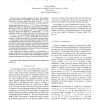Free Online Productivity Tools
i2Speak
i2Symbol
i2OCR
iTex2Img
iWeb2Print
iWeb2Shot
i2Type
iPdf2Split
iPdf2Merge
i2Bopomofo
i2Arabic
i2Style
i2Image
i2PDF
iLatex2Rtf
Sci2ools
148
click to vote
COCO
2010
Springer
2010
Springer
Derandomized Parallel Repetition Theorems for Free Games
—Raz’s parallel repetition theorem [21] together with improvements of Holenstein [12] shows that for any two-prover one-round game with value at most 1 − (for ≤ 1/2), the value of the game repeated n times in parallel on independent inputs is at most (1− )Ω( 2n ) where is the answer length of the game. For free games (which are games in which the inputs to the two players are uniform and independent) the constant 2 can be replaced with 1 by a result of Barak, Rao, Raz, Rosen and Shaltiel [1]. Consequently, n = O(t ) repetitions suffice to reduce the value of a free game from 1 − to (1 − )t , and denoting the input length of the game by m, if follows that nm = O(t m ) random bits can be used to prepare n independent inputs for the parallel repetition game. In this paper we prove a derandomized version of the parallel repetition theorem for free games and show that O(t(m+ )) random bits can be used to generate correlated inputs such that the value of the parallel repetiti...
Related Content
| Added | 15 Aug 2010 |
| Updated | 15 Aug 2010 |
| Type | Conference |
| Year | 2010 |
| Where | COCO |
| Authors | Ronen Shaltiel |
Comments (0)

